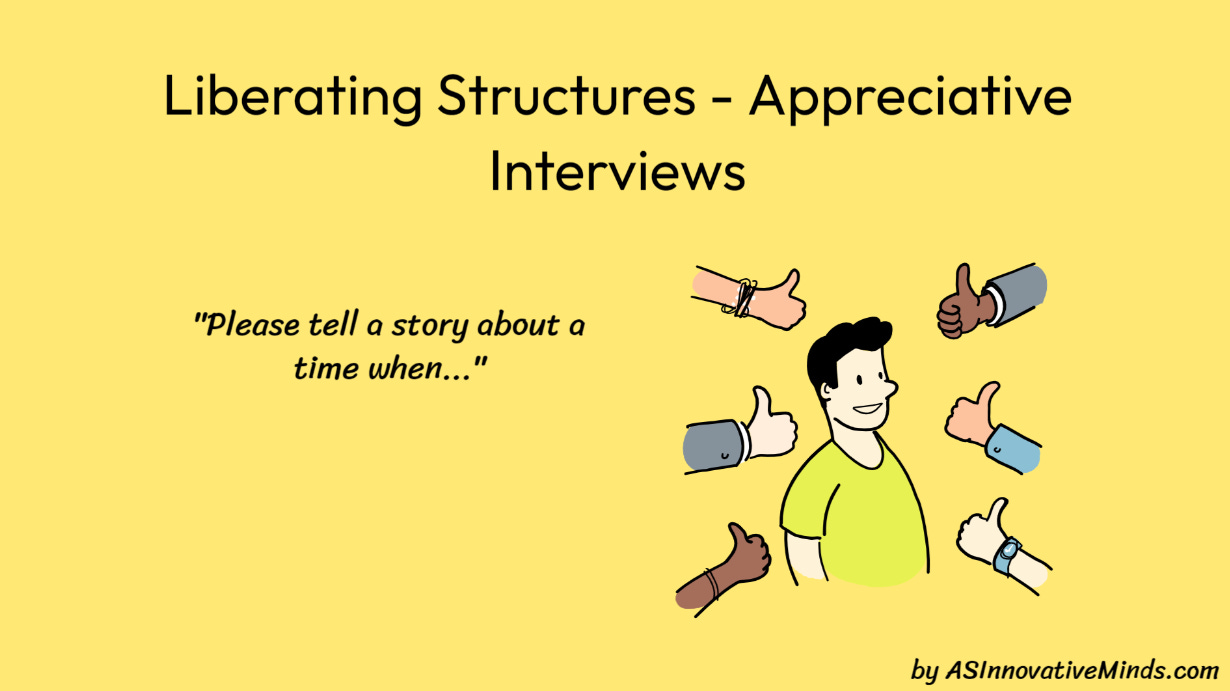Appreciative Interviews And How Do They Fit To Each Personality - Liberating Structures Activity
Discovering and Building on the Root Causes of Success
We are usually focused on problems, how to solve them, how to gather pain points, and so on.
Adding the experiences that brought us emotions that helped us is the piece that sometimes is missing.
Why is this important?
Because exactly these emotions are bringing the energy levels we need to go forward and reach our goals, right?
Because they are also bonding people together, creating a sense of group similarities, and sharing joy. This releases oxytocin and creates a trusting and safe environment.
The aim of this activity is to bring awareness to success stories, why they worked and the magic behind them.
This is done through specific steps (you can check the resources for this) while starting small in pairs of two sharing their stories then in groups of 4.
The exercise practices active listening as well because if you do not listen to what your conversation partner says, you will not be able to tell their story to the bigger group.
The story behind the story of this article :)
I am not often a participant in sessions and last week I was at the unconference ComoCamp where I had experienced various sessions as a participant as well. Being used to being the trainer or facilitator puts me in a position where sometimes I like to participate and observe what happens from a participant's perspective.
So, I was a participant in a super great session facilitated by Martin Günther to experience Liberating Structure activities. I was using it already some of their activities in my sessions, but I have not been a participant so far in these activities.
And I was embarrassed at one moment in time. People tell me I am a good listener. And I was not able to tell the story of what my conversation partner told me in detail, I was just sharing the emotions and vibes that he shared about it with me. And when he was sharing all the details I was telling him, I was not comfortable that I was not able to do that as well.
So then I reflected on why was this happening. And I came up with some insights on how different personality types are reacting to it.
How does this activity work with different personality types?
PCM (Process Communication Model®) is an innovative model that allows you to understand the depth of personality structure.
Created by Taibi Kahler in the 1970s, PCM was used by NASA in the training and selection of astronauts for 20 years, and today used by many well-known Fortune 500 companies.
According to PCM, we all have 6 personality types in us, that influence how we think, feel, and behave.
Each type has its own perceptual filter, a preferred way of seeing the world.
🎲 Harmonizer - they care about the feelings of the persons involved, how scary is the whole experiment, the general vibe, and how comfortable they are with it. Appreciative interviews are bringing them exactly what they like: feelings. And because they care so much about this, they remember mostly only about those in this exchange. Then they arrive in distress about silly mistakes and blame themselves they were not listening more :)
🎲 Thinker: likes to have data and facts and has the tendency to create logical connections between different topics. If they are also good listeners, then they are probably perfect for this activity as they will remember most details of the story their conversation partner told them.
🎲 Persister: likes to offer his opinion and beliefs about specific topics. They are also attentive to details usually so they might be able to remember facts but also the ones that they can relate to most as they will connect the shared stories with their own values and beliefs. What it will be hard for them is to not interrupt the conversation partner with their own opinions and share what they think about that topic.
🎲Imaginer - they reflect a lot, having a lot happening inside their own world, powerful imagination. It can be that they will add some sparkle out of their own imagination to the story told by their conversation partner as they imagine while the partner talks the story in their head and creates their own representation of that, which becomes the story itself then.
🎲 Rebel - they like to have fun and react to the world with likes/dislikes. They will remember for sure the funny sides of the stories and share them with an enthusiastic approach as well :)
🎲 Promoter - they need actions and get things done. They will be focused on which were the outcomes and the steps to arrive there. So probably they will be able to explain in short sentences the highlights of the story in terms of outcome + action steps to reach it.
Bottom lines:
Each person reacts differently to an activity because we are all unique. Relevant is to be aware of this and be kind to ourselves. One of the things I like to do when facilitating an activity that I know will fit different personality types is to set the expectations upfront and tell them how this might be for them. They can relate to it and feel comfortable then.
Did you identify my personality type? :)
Next time I take something to write to remember more….
Resources:
Liberating Structures Appreciation Interviews - step-by-step explanation
The facilitator we had for this activity - Martin Günther Consulting
If you want to learn how to “read” the room taking care of different personalities’ psychological needs, PCM training with Magda Tabac will help for sure



Such an insightful article, dear Andra! I love how you connected the six Personality Types and their characteristics to how they would act in an Appreciative Interview situation. And I agree with the insights you shared.